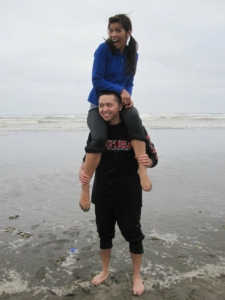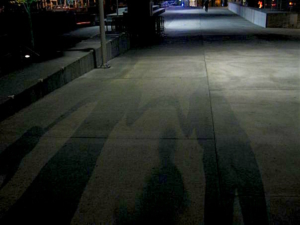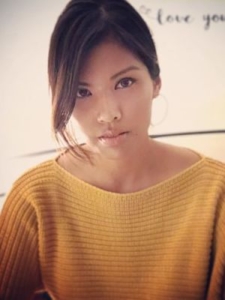Julian
TRIGGER WARNING: This blog contains the subject of abortion.
When I was young, I used to boast to my middle-aged friends that I didn’t mind growing old. Wrinkling would be like wearing an accordion, a folded face for kids to marvel at when I spoke the mystic tales of my youth. I felt self-assured by the notion of worn experience. “I wouldn’t mind crow’s feet,” I blabbed on as if loose skin was the only mark of maturity. I wouldn’t have to earn trust. I would look credible—perhaps even sound it. Wouldn’t it feel good to just cacoon my body in age?
There are many days I think about slapping that smug, perfect complexion right off my face. It’s not that I believed I was invincible. I knew what it felt like to have my body break, but it was easier to hide pain and blow it off when I was younger. After a while, those cracks lie dormant.
A year ago, I was walking my dog when a stabbing jolt reverberated from my pelvis and collapsed me to my knees. I crawled all the way home tenderly pressing on an unknown organ. My middle-aged self told me to go see a doctor, but my younger self refused. I thought I would bounce back in a week, worried about a deductible. Who was I kidding? I was older and in good fortune. I could afford my deductible. Perhaps I could even afford more time, I convinced myself. So, I swallowed ibuprofen and sweat through my sheets for two days.
Denial is the first sign of premature aging. The wrong kind of aging that denies changes, and the sudden shifting of the metronomes of good health and feminine that I relied on every month. Cramping, check. Emotions, check. Cry, get a pimple, bleed, let go. Every month I had a vessel in me that erupted with life, but now it was raging with fever. My body widening in a constant scream. I wasn’t listening until my family could see me plummeting into insurmountable pain and fatigue. I could no longer tolerate the stress alone.
* * *
 The visit to the specialist’s office is supposed to be a quick fix. I hadn’t gone to a women’s clinic in years. This one is located in a mall with floor-to-ceiling lobby windows visible to the skating rink next door. There is a television in the room playing The Nutcracker. The nurse sits me down on a tufted chair while a young Clara finds her way into the wintery realms. Women’s medicine has changed in the time that I had been avoiding it. I expect the doctor to come in and give me a facial treatment, but the pressure between my legs reminds me of where I am and why. Something was going to fall out. My gaze shifts to the movie, imagining a waltz sending me back into snowflakes.
The visit to the specialist’s office is supposed to be a quick fix. I hadn’t gone to a women’s clinic in years. This one is located in a mall with floor-to-ceiling lobby windows visible to the skating rink next door. There is a television in the room playing The Nutcracker. The nurse sits me down on a tufted chair while a young Clara finds her way into the wintery realms. Women’s medicine has changed in the time that I had been avoiding it. I expect the doctor to come in and give me a facial treatment, but the pressure between my legs reminds me of where I am and why. Something was going to fall out. My gaze shifts to the movie, imagining a waltz sending me back into snowflakes.
* * *
We drove to a gray, inconspicuous plaza between the trees, adjacent to the hospital. It could have been a dentist’s office, a chiropractor, or a bookie’s storefront. I almost missed the entrance to the clinic if it weren’t for the signage that pointed us in. My memory has since repressed the lettering on the sign, but I remember the severe red, the flesh of a fetus, unrecognizable if not for my purpose in being there.
My boyfriend and I sat together but not holding hands. Someone switched the dreary static on a tube TV to Top Gun but the language droned on. It’s funny the details I can remember: the wood wall veneers, a paned receptionist window, two acquaintances chatting away about their timeslot as if we were at the dentist. Everyone has their way of dealing with things.
We named our baby Julian when I found out I was pregnant. “Julian,” meaning youthful, optimistic—having just graduated from high school, we understood. We were only supposed to be a summer fling, but every girl remembers the first boy they felt safe with. The summer we put puzzles together, bowled, went to Denny’s. We were just kids with too much time to pretend at falling in love.
 Summer ended, and winter arrived with our unexpected news. He marveled at my belly, but all I could think about was standing in line with a generation of young mothers. And my father. He would come home from his extended trip to find his last daughter pregnant, a stigma that echoed into the bleak hall when they called my name to go forward. My boyfriend stood up. Maybe he said, “I love you” before the door closed, but I never said it back. How could love exist beyond those doors? I wouldn’t think of it then.
Summer ended, and winter arrived with our unexpected news. He marveled at my belly, but all I could think about was standing in line with a generation of young mothers. And my father. He would come home from his extended trip to find his last daughter pregnant, a stigma that echoed into the bleak hall when they called my name to go forward. My boyfriend stood up. Maybe he said, “I love you” before the door closed, but I never said it back. How could love exist beyond those doors? I wouldn’t think of it then.
My clothes were carted away in a purple tub. I’m told they’ll be waiting when I am done, and I’m escorted into a dim room with a faux fish tank. The finned shadows carousel around the room. All the bullshit twirled in my head. I’m supposed to breathe slowly, but my lungs cut my voice when I tried to murmur something. My vision blurred from the light of an open door, and I felt the grip of nurses. The rest was muddled from anesthesia and sedatives.
The drugs numbed the order in which I remember my grief. I woke up in a hallway. Stark white curtains separated my hospital bed from other un-mothers. The song, “I’ll Be Home For Christmas,” was playing above because that’s right—it was Christmas break, and I asked for my baby so we could go home for the holiday. The nurse shook her head and said they couldn’t do that for me. Then, they tucked a napkin between my legs and sent me waddling back down the hall to my boyfriend.
 We went home together with a white pharmaceutical bag. My boyfriend, still a boy, didn’t know how to register loss and went to another room to cry. But I wouldn’t and didn’t for a long time. I didn’t even get up to hold him. I’m carved out on the floor. I’ll heal by the time my father gets home as if I were a piece of a vase glued back together. My father will notice a crack, and I’ll break the news that he won’t be a grandfather until I’m finished with college and married as it should be. I won’t keep this promise.
We went home together with a white pharmaceutical bag. My boyfriend, still a boy, didn’t know how to register loss and went to another room to cry. But I wouldn’t and didn’t for a long time. I didn’t even get up to hold him. I’m carved out on the floor. I’ll heal by the time my father gets home as if I were a piece of a vase glued back together. My father will notice a crack, and I’ll break the news that he won’t be a grandfather until I’m finished with college and married as it should be. I won’t keep this promise.
* * *
An acquaintance wrote about a similar experience as a young teenager faced with the same choice. She has since flourished as a nurse, tending to wounds and healing people. She wrote her story as an act of clemency for the women who choose to terminate their pregnancies. I read it and thought she was only speaking to the women with fortitude. The women who close their eyes and know they will carry their choice with grace for the rest of their lives.
Then, there are women like me who shut the door to that sentiment. I felt I didn’t deserve Julian’s father at the time. I didn’t deserve my capable body or the uncomplicated conceptions. Shame defined my womanhood, then motherhood when I gave birth to my first son two years later. The vessel in me expanded and shrank, carved and bubbled, carrying the scars, my past becoming my present: a hysterectomy.
The specialist asks me how many pregnancies I’ve had and how many children are alive. I turn away from the young Clara on the television, and look down at the handful of informational pamphlets to take home. “Come back and tell me your decision,” she says. I fold them into my hands. My decisions.
When I disclose my prognosis to well-intentioned loved ones, they remind me, “I’m so sorry, but you are lucky to have your children.” They couldn’t be more right. I gave birth to three, healthy children, but this unnamed loss swells inside of me. I am frightened to part with a piece of myself or discard it as if to say, “Thank you for doing your job. Farewell.” I want to put my hand on the bloated pain and pet my shame. Wear my experience and thank Julian for this life. It is time to bury you, and I’m so sorry. Farewell.
Cristina Medina lives in South Los Angeles with her family and Chorkie. She is currently an MFA Candidate at Antioch University, Los Angeles and Guest Blogger for Lunch Ticket. Her work can be seen in Angel City Review, Chaleur Magazine, Gordon Square Review, and Silverneedle Press.





